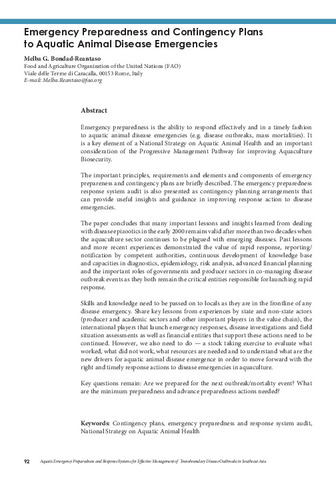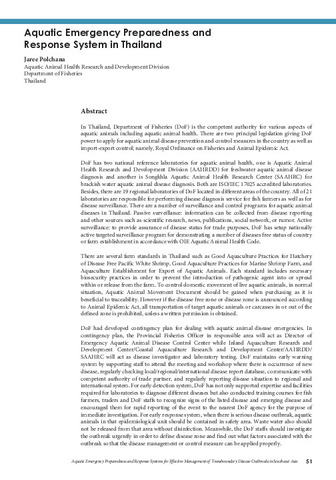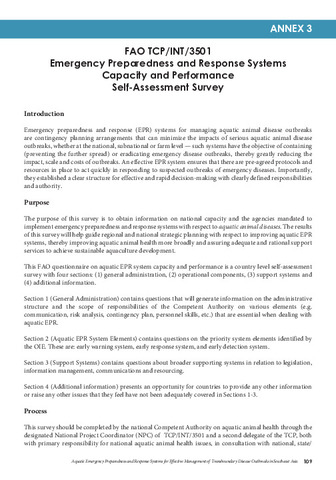Perlihatkan publikasi sederhana
Emergency preparedness and contingency plans to aquatic animal disease emergencies
| dc.contributor.author | Bondad-Reantaso, Melba G. | |
| dc.contributor.editor | Tendencia, Eleonor A. | |
| dc.contributor.editor | de la Peña, Leobert D. | |
| dc.contributor.editor | de la Cruz, Joesyl Marie V. | |
| dc.date.accessioned | 2019-07-23T08:09:27Z | |
| dc.date.available | 2019-07-23T08:09:27Z | |
| dc.date.issued | 2019 | |
| dc.identifier.citation | Bondad-Reantaso, M. G. (2019). Emergency preparedness and contingency plans to aquatic animal disease emergencies. In E. A. Tendencia, L. D. de la Peña, & J. M. V. de la Cruz (Eds.), Aquatic Emergency Preparedness and Response Systems for Effective Management of Transboundary Disease Outbreaks in Southeast Asia: Proceedings of Asean Regional Technical Consultation, 20-22 August 2018, Centara Grand Central Ladprao, Bangkok, Thailand (pp. 92-98). Tigbauan, Iloilo, Philippines: Aquaculture Department, Southeast Asian Fisheries Development Center. | en |
| dc.identifier.isbn | 9789719931089 | |
| dc.identifier.uri | http://hdl.handle.net/10862/3471 | |
| dc.description.abstract | Emergency preparedness is the ability to respond effectively and in a timely fashion to aquatic animal disease emergencies (e.g. disease outbreaks, mass mortalities). It is a key element of a National Strategy on Aquatic Animal Health and an important consideration of the Progressive Management Pathway for improving Aquaculture Biosecurity. The important principles, requirements and elements and components of emergency prepareness and contingency plans are briefly described. The emergency preparedness response system audit is also presented as contingency planning arrangements that can provide useful insights and guidance in improving response action to disease emergencies. The paper concludes that many important lessons and insights learned from dealing with disease epizootics in the early 2000 remains valid after more than two decades when the aquaculture sector continues to be plagued with emerging diseases. Past lessons and more recent experiences demonstrated the value of rapid response, reporting/notification by competent authorities, continuous development of knowledge base and capacities in diagnostics, epidemiology, risk analysis, advanced financial planning and the important roles of governments and producer sectors in co-managing disease outbreak events as they both remain the critical entities responsible for launching rapid response. Skills and knowledge need to be passed on to locals as they are in the frontline of any disease emergency. Share key lessons from experiences by state and non-state actors (producer and academic sectors and other important players in the value chain), the international players that launch emergency responses, disease investigations and field situation assessments as well as financial entities that support these actions need to be continued. However, we also need to do - a stock taking exercise to evaluate what worked, what did not work, what resources are needed and to understand what are the new drivers for aquatic animal disease emergence in order to move forward with the right and timely response actions to disease emergencies in aquaculture. Key questions remain: Are we prepared for the next outbreak/mortality event? What are the minimum preparedness and advance preparedness actions needed? | en |
| dc.language.iso | en | en |
| dc.publisher | Aquaculture Department, Southeast Asian Fisheries Development Center | en |
| dc.title | Emergency preparedness and contingency plans to aquatic animal disease emergencies | en |
| dc.type | Conference paper | en |
| dc.citation.spage | 92 | |
| dc.citation.epage | 98 | |
| dc.citation.conferenceTitle | Aquatic Emergency Preparedness and Response Systems for Effective Management of Transboundary Disease Outbreaks in Southeast Asia: Proceedings of Asean Regional Technical Consultation, 20-22 August 2018, Centara Grand Central Ladprao, Bangkok, Thailand | en |
| dc.subject.asfa | disease control | en |
| dc.subject.asfa | disease recognition | en |
| dc.subject.asfa | disease resistance | en |
| dc.subject.asfa | disease transmission | en |
| dc.subject.asfa | epidemiology | en |
| dc.subject.asfa | husbandry diseases | en |
| dc.subject.asfa | aquaculture regulations | en |
| dc.subject.asfa | quarantine regulations | en |
| dc.subject.asfa | fish culture | en |
| dc.subject.asfa | fish diseases | en |
| dc.subject.asfa | aquatic animals | en |
| dc.subject.asfa | aquatic organisms | en |
| dc.subject.asfa | risk management | en |
| dc.subject.asfa | emergencies | en |
| dc.subject.asfa | animal diseases | en |
| dc.subject.asfa | biosecurity | en |
| dc.subject.asfa | aquaculture | en |
Files in this item
Publikasi ini ada di koleksi berikut
-
Aquatic Emergency Preparedness and Response Systems for Effective Management of Transboundary Disease Outbreaks in Southeast Asia [20]
Proceedings of ASEAN Regional Technical Consultation, 20-22 August 2018, Centara Grand Central Ladprao, Bangkok, Thailand





